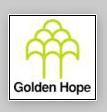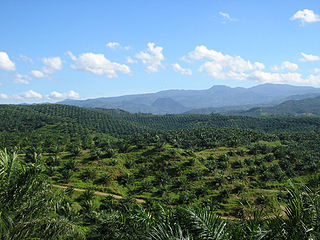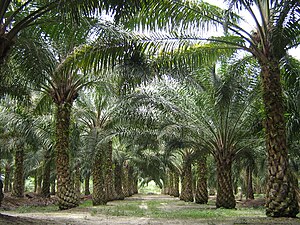
Palm oil is an edible vegetable oil derived from the mesocarp of the fruit of oil palms. The oil is used in food manufacturing, in beauty products, and as biofuel. Palm oil accounted for about 36% of global oils produced from oil crops in 2014. Palm oils are easier to stabilize and maintain quality of flavor and consistency in ultra-processed foods, so are frequently favored by food manufacturers. On average globally, humans consumed 7.7 kg (17 lb) of palm oil per person in 2015. Demand has also increased for other uses, such as cosmetics and biofuels, creating more demand on the supply encouraging the growth of palm oil plantations in tropical countries.
Tun Musa bin Hitam is a Malaysian retired politician who served as the Deputy Prime Minister of Malaysia from 1981 to 1986, serving under Mahathir Mohamad. He was the chairman of Sime Darby Berhad.
Palm kernel oil is an edible plant oil derived from the kernel of the oil palm tree Elaeis guineensis. It is related to two other edible oils: palm oil, extracted from the fruit pulp of the oil palm, and coconut oil, extracted from the kernel of the coconut.

Sime Darby Berhad is a Malaysian trading conglomerate. Its core businesses operate and serve in the industrial, motors and logistics sectors as well as the healthcare, and insurance segments.
Guthrie Group Limited was a Singaporean-Malaysian company that primarily dealt with plantations. It merged with three other plantation groups to form the world's largest plantation company with the name of Sime Darby Berhad.

Golden Hope Plantations Berhad (GHPB) was an estate and plantations company in Malaysia.

IOI Corporation Berhad, commonly referred to as IOI, was incorporated on 31 October 1969 as Industrial Oxygen Incorporated Sdn Bhd. IOI is one of Malaysia's biggest conglomerates. It ventured into oil palm plantations in 1983, followed by property development in 1984 and refineries in 1997. IOI was listed on the Kuala Lumpur Stock Exchange (KLSE) and trading as MYX: 1961—now known as Bursa Malaysia—in 1980.
The protection of basic human rights is enshrined in Constitution of Malaysia. These include liberty of the person and prohibition of slavery and forced labour. At the national level, legislative measures that exist to prevent human rights violations and abuses can be found in acts and laws on issues that either have a human rights component or relate to certain groups of society whose rights may be at risk of being violated. Human rights groups are generally critical of the Malaysian government and the Royal Malaysia Police. Preventive detention laws such as the Internal Security Act and the Emergency Ordinance 1969 allow for detention without trial or charge and as such are a source of concern for human rights organizations like Suara Rakyat Malaysia.

This article describes the use and availability of biodiesel in various countries around the world.

The Malaysian Palm Oil Board, abbreviated MPOB, is a government agency responsible for the promotion and development of the palm oil industry in Malaysia. It is one of the agencies under the Ministry of Plantation Industries and Commodities.

The use of biofuels varies by region. The world leaders in biofuel development and use are Brazil, United States, France, Sweden and Germany.

Palm oil, produced from the oil palm, is a basic source of income for many farmers in South East Asia, Central and West Africa, and Central America. It is locally used as cooking oil, exported for use in much commercial food and personal care products and is converted into biofuel. It produces up to 10 times more oil per unit area than soybeans, rapeseed or sunflowers.
Wilmar International Limited is a Singaporean food processing and investment holding company with more than 300 subsidiary companies. Founded in 1991, it is one of Asia's leading agribusiness groups alongside the COFCO Group. It ranks amongst the largest listed companies by market capitalisation on the Singapore Exchange (SGX), being the second largest as of September 2010. It was ranked 211th in the Fortune Global 500 list in 2020. It was ranked 3rd in the World's Most Admired Company by Fortune in 2019.

The Roundtable on Sustainable Palm Oil (RSPO) was established in 2004 with the objective of promoting the growth and use of sustainable palm oil products through global standards and multistakeholder governance. The seat of the association is in Zürich, Switzerland, while the secretariat is currently based in Kuala Lumpur, with a satellite office in Jakarta. RSPO currently has 5,650 members from 94 countries.

The Federal Land Development Authority is a Malaysian government agency that was founded to handle the resettlement of rural poor into newly developed areas and to organize smallholder farms growing cash crops.

Elaeis guineensis is a species of palm commonly just called oil palm but also sometimes African oil palm or macaw-fat. It is the principal source of palm oil. It is native to west and southwest Africa, specifically the area between Angola and The Gambia; the species name, guineensis, refers to the name for the area called Guinea, and not the modern country Guinea now bearing that name. The species is also now naturalised in Madagascar, Sri Lanka, Malaysia, Indonesia, Central America, Cambodia, the West Indies, and several islands in the Indian and Pacific Oceans. The closely related American oil palm E. oleifera and a more distantly related palm, Attalea maripa, are also used to produce palm oil.

FGV Holdings Berhad is a Malaysian-based global agribusiness and food company. It is an affiliate of the Federal Land Development Authority (FELDA).

Palm oil production is important to the economy of Indonesia as the country is the world's biggest producer and consumer of the commodity, providing about half of the world's supply. In 2016, Indonesia produced over 34.6 million metric tons of palm oil, and exported 25.1 million metric tons of it. Oil palm plantations stretch across at least 12 million hectares. There are several different types of plantations, including small, privately owned plantations, and larger, state-owned plantations. There are a variety of health, environmental, and societal impacts that result from the production of palm oil in Indonesia. A recent publication by the NGO Rainforest Action Network (RAN) indicates that the use of palm oil by some of the biggest chocolate and snacks' producers is increasing this problem.
Tan Sri Datuk Dr. Yusof Basiron is a scientist and an influential public figure in the Malaysian palm oil industry. He was the CEO of the Malaysian Palm Oil Council (MPOC), and a non-independent non-executive director on the board of Sime Darby.
Nucleus estate and smallholder (NES) is a farming system for commodity crops, often oil palm, practised in different world regions. It is most famous today for its application in the palm oil sector in Indonesia. The nucleus is the part of such a plantation that is under concession and management of the company, while another part of the plantation is operated by smallholders typically on their own land but planted by the company. NES farming is a particular form of contract farming.













